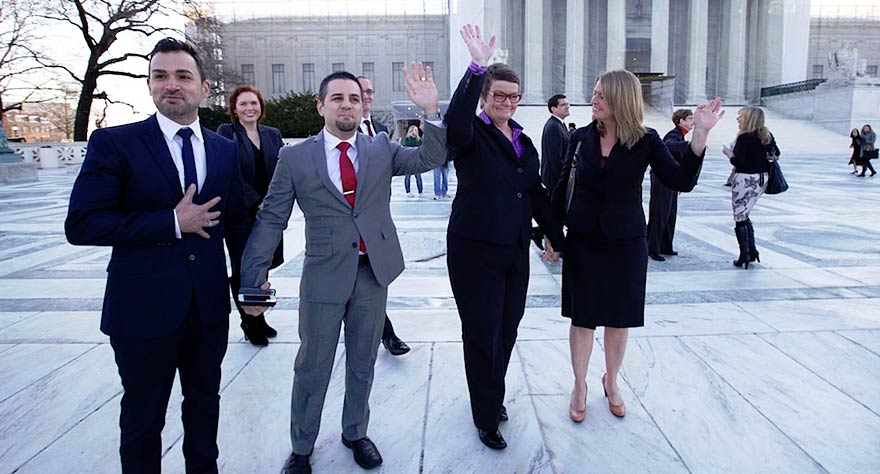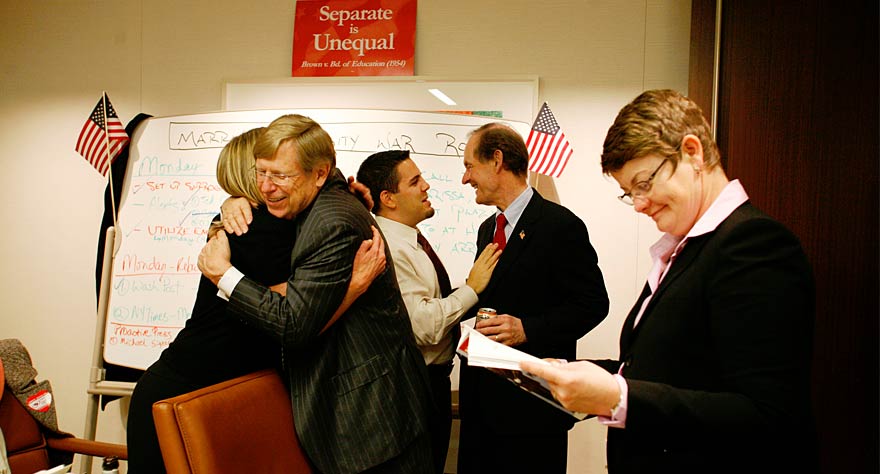
Feels more like a pat-on-the-back for itself and a history lesson for those who know little about the subject.

Feels more like a pat-on-the-back for itself and a history lesson for those who know little about the subject.
Chances are you’ve at least heard of Proposition 8 even if you don’t live in California, but back in 2008, which feels like a whole other era now, the California Supreme Court ruled same-sex couples had the right to get married. That in of itself was probably the biggest civil rights movement of our time, allowing 18,000 same-sex couples to get married in the state which typically sets the trend on political policies and progressive idealism. But this crowning achievement was very short-lived. Just six months later, voters passed a ballot initiative called Proposition 8 (known informally as Prop 8) which defined marriage only valid between a man and a woman.
The Case Against 8 directors Ben Cotner and Ryan White follow an important and courageous case to overturn the ban of same-sex marriage in California through the various court levels and procedures. While the documentary presents the legal battle in rather straightforward fashion, it’s still intriguing due to the significance of the subject. Constant back-and-forth court appeals makes every “win” come with an asterisk and at the same time unintentionally shows the complexity and nonsensical side of our judicial system.
One of the biggest surprises in the case came early on from an unlikely source—a high-profile attorney named Ted Olson who is revered in the republican party. After famously representing George W. Bush in the Supreme Court case Bush v. Gore, which ended the recount in the 2000 Presidential election, Olson’s decision to take on this case was shocked everyone. Though no one was more amazed than David Boies, who worked against Olson in that Bush v. Gore case, but now will working as partners on this case. Watching these two opposing political party attorneys work together proves that deep down this case has an important human rights issue. While The Case Against 8 isn’t just about the lawyers, they get the most attention since they’re far more interesting to watch than the admittedly ordinary gay couples they represent. For better or worse characterization isn’t the prime focus here, it’s the case itself.

Since cameras aren’t permitted in the courts, Cotner and White have little choice but to show the court transcripts onscreen and play audio from the courtroom. While this doesn’t make for the most cinematic presentation, there are some insightful moments during the clips. Like when the defending side argues the principal difference between same-sex and opposite-sex marriage is that one can procreate and the other cannot, brilliantly countered by Olson asking if sterile couples of different sexes should then be allowed to marry. But the biggest “aha moment” in the trial is when opponents get asked what harm comes from same-sex couples getting married and they simply respond back with, “I don’t know.”
Yes, it’s truly amazing (and long overdue) that gay marriage is finally legal in some states, which just so happened around the same time we elected our first black president. But just because the subject is groundbreaking doesn’t automatically make the documentary groundbreaking too. The Case Against 8 is completely one-sided, making it feel like a “2-hour victory lap” as described by Way Too Indie writer CJ at its Hot Docs premiere. Because the outcome of the case is widely known and the documentary does little to actually sway opinions on the matter, The Case Against 8 feels more like a pat-on-the-back for itself and a history lesson for those who know little about the subject. The biggest shock is discovering same-sex marriage is still illegal in 31 states during the credits, assuring there’s still a lot more that needs to be done.